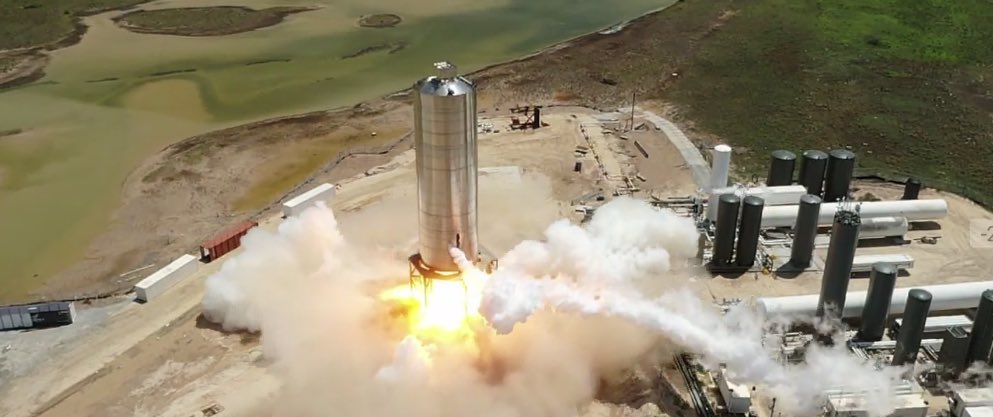SpaceX fires up Starship SN5 rocket prototype ahead of first test flight
Breaking space news, the latest updates on rocket launches, skywatching events and more!
You are now subscribed
Your newsletter sign-up was successful
Want to add more newsletters?

Delivered daily
Daily Newsletter
Breaking space news, the latest updates on rocket launches, skywatching events and more!

Once a month
Watch This Space
Sign up to our monthly entertainment newsletter to keep up with all our coverage of the latest sci-fi and space movies, tv shows, games and books.

Once a week
Night Sky This Week
Discover this week's must-see night sky events, moon phases, and stunning astrophotos. Sign up for our skywatching newsletter and explore the universe with us!

Twice a month
Strange New Words
Space.com's Sci-Fi Reader's Club. Read a sci-fi short story every month and join a virtual community of fellow science fiction fans!
SpaceX just fired the engine of its latest Starship prototype, paving the way for a test flight in the near future.
The company conducted a "static fire" test of Starship SN5 today (July 30), letting its single Raptor engine blaze while the vehicle remained tethered to the ground at SpaceX's South Texas facilities, near the village of Boca Chica.
The successful trial apparently earned the stainless-steel SN5, a test version of SpaceX's Mars-colonizing Starship spacecraft, a chance to slip its leash.
"Starship SN5 just completed full-duration static fire. 150m hop soon," SpaceX founder and CEO announced via Twitter today (July 30).
Related: SpaceX's Starship and Super Heavy Mars Rocket in Pictures
SpaceX has been iterating toward the final Starship design via a series of SN prototypes. Most of SN5's predecessors were lost at some point in the testing process, either during pressure trials or static fires. SN4, for example, exploded during a static fire on May 30, the fifth such test for the prototype.
But SpaceX doesn't seem inclined to subject the SN5 to so many engine trials. If Musk's tweet is any guide, the vehicle could rise about 500 feet (150 meters) into the South Texas skies sometime in the next few days.
Breaking space news, the latest updates on rocket launches, skywatching events and more!
Just one Starship prototype has made such an untethered flight to date: the stubby Starhopper, an early variant that was retired after getting several hundred feet off the ground in August 2019.
The final version of Starship will feature six Raptor engines, stand about 165 feet (50 m) tall and be capable of carrying up to 100 people, Musk has said. The spaceship will launch atop a gigantic rocket called Super Heavy, which will be powered by 31 Raptors of its own.
Starship and Super Heavy will be fully and rapidly reusable, Musk has said. The billionaire entrepreneur envisions the duo eventually filling all of SpaceX's needs, from launching satellites to Earth orbit to ferrying passengers to the moon, Mars and beyond.
The spaceflight system could get up and running quickly if testing and development go well. SpaceX representatives have said that the first Starship/Super Heavy missions — likely launches of commercial communications satellites — could come as early as 2021.
Mike Wall is the author of "Out There" (Grand Central Publishing, 2018; illustrated by Karl Tate), a book about the search for alien life. Follow him on Twitter @michaeldwall. Follow us on Twitter @Spacedotcom or Facebook.

Michael Wall is a Senior Space Writer with Space.com and joined the team in 2010. He primarily covers exoplanets, spaceflight and military space, but has been known to dabble in the space art beat. His book about the search for alien life, "Out There," was published on Nov. 13, 2018. Before becoming a science writer, Michael worked as a herpetologist and wildlife biologist. He has a Ph.D. in evolutionary biology from the University of Sydney, Australia, a bachelor's degree from the University of Arizona, and a graduate certificate in science writing from the University of California, Santa Cruz. To find out what his latest project is, you can follow Michael on Twitter.

